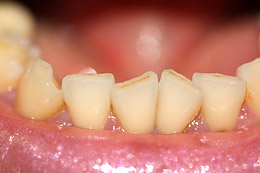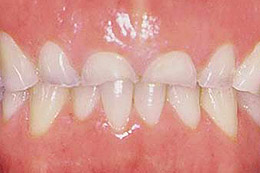Teeth Grinding
Everyone feels stress or tension at times. For some people, stress can manifest itself as neck and back pain or headaches. For others, it results in an unconscious clenching and grinding of teeth, especially during sleep. Tooth grinding can affect the total well being of your mouth and cause serious problems.
Teeth Grinding can cause:
- alterations your natural bite
- cracked and fractured teeth and fillings
- severe muscular pain
- temporomandibular joint dysfunction (TMJ)
- grinding grinding
In addition to tooth grinding, temporomandibular joint dysfunction can also be caused by a trauma or injury an incorrect bite, poor posture, sleep position or the loss of many teeth, especially back teeth
The symptoms of temporomandibular joint dysfunction (TMJD) include:
- headaches and dizziness
- muscular pain in the lower part of the face that radiates to the neck, back and shoulders
- buzzing or ringing in the ears
Treatment options for Teeth Grinding and TMJD
These symptoms can occasionally abate on their own if they’ve been caused by stress that passes or if the dental issue goes away. Many cases result from a neck injury such as whiplash. In this case, we’ll assess the cause of your teeth grinding and then, where applicable recommend physiotherapy.
If the issues don’t abate, Robert Duhig Dental Sandgate has had great success with specialist programs.
Exercises and Oral Splints
A special program of exercises can strengthen weakened muscles that are susceptible to muscular pain. Robert Duhig Dental can provide simple and quick exercises that have helped around 50% of our patients with TMJD. Sometimes, an acrylic oral splint needs to be worn at night, when you are most likely to grind your teeth. This splint separates the upper and lower teeth so they can’t clench together. It protects the teeth from further damage and relieves muscle soreness.
If you think you are grinding your teeth, talk to us about how we can help.
Book Online, or call our friendly reception team on 07 3269 2443


